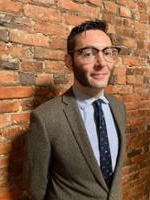
Zachary Loeb
- Assistant Professor // History
- Assistant Professor // Cornerstone
Research Focus
Computing, Cybersecurity, Technology, Disasters
Office and Contact
Room: BRNG 6116
Office hours:
- Fall 2025:
- Tuesdays and Thursdays, 2:00pm-4:00pm
Email: zloeb@purdue.edu
Phone: (765) 496-2468
Zachary Loeb is interested in the end of the world. More specifically, he is interested in the idea that humanity’s romance with technology has the species (and the planet) on a course that may lead to catastrophe. He is historian of technology, disasters, and technological disasters, with a particular interest in the ways that technological developments (especially as they relate to computing) create and exacerbate real and imaginary risks. He received his PhD in 2023 from the History and Sociology of Science department at the University of Pennsylvania—where his research was supported by, amongst others, the Charles Babbage Institute, the Andrea Mitchell Center for the Study of Democracy, and the Association for Computing Machinery.
He is currently working on a book project on the year 2000 computing crisis, better known simply as Y2K, tentatively titled “Almost Midnight: Y2K and the Race to Save the World as We Have Come to Know It.” This project traces the way that various groups—from IT professionals, to elected officials, to journalists, to community activists, to religious groups—tried to make sense of Y2K and the steps they took to prevent, or prepare, for this potential calamity. While contrasting the apocalyptic way that the media frequently framed the problem with the more sober analysis being issued by computing professionals, this project focuses on the way that Y2K exposed how reliant societies had become on computer systems by the close of the twentieth century, and the way it forced them to reckon with the chaos that would occur if those computer systems were to stop working properly.
Beyond Y2K, Loeb is also interested in the history of cybersecurity, social disruptions caused by computer failures, the history of technological doomsaying, and the lives and ideas of past critics of technology (particularly Lewis Mumford and Joseph Weizenbaum). His work on Y2K, and past critics of technology, has appeared in The Washington Post, Real Life Magazine, TIME, Boundary 2, several edited volumes, and he has been interviewed about Y2K on CNN, NPR, CBC-Montreal, and Vox.
Prior to earning his PhD, he earned an MA from the department of Media, Culture, and Communication at NYU, and an MSIS from the Information School at the University of Texas at Austin. He has worked for several libraries including the Center for Jewish History, the New York Public Library, the People’s Library of Zucotti Park, and the Kislak Center for Special Collections, Rare Books and Manuscripts.
Dr. Loeb is accepting graduate students in the History of Technology, History of Computing, and History of Disasters.